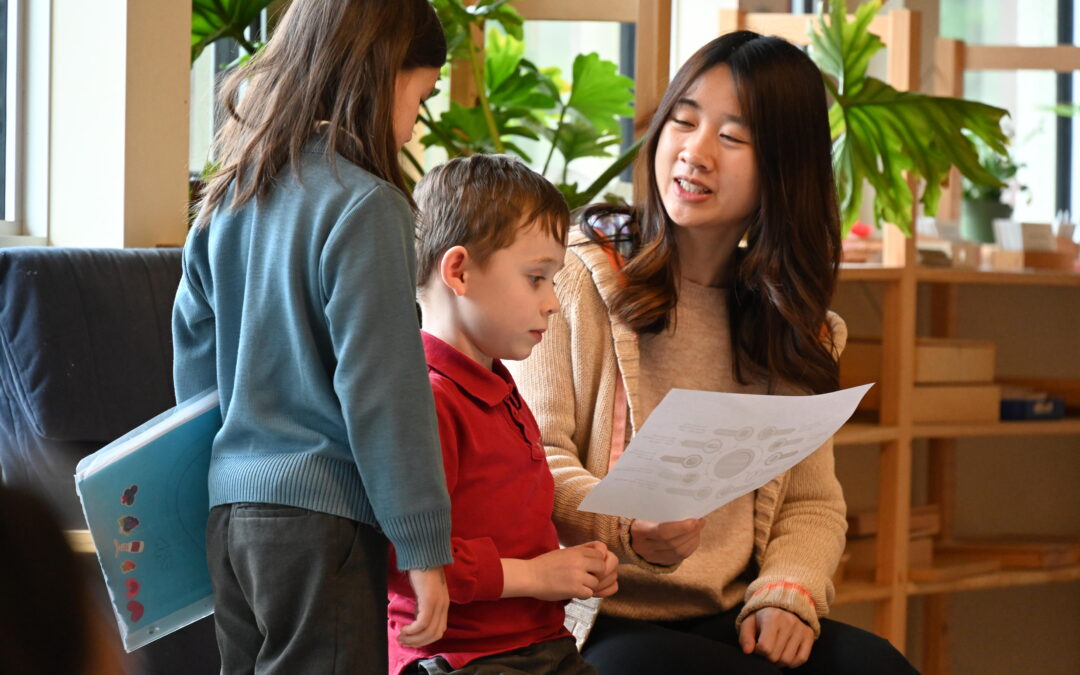The Science Behind Montessori
Research Every Victoria Parent Should Read
essential evidence for victoria families choosing private education
Skeptical about Montessori? Here’s what decades of educational research reveals about this powerful learning approach.
When Dr. Maria Montessori developed her educational method over a century ago, she built it on scientific observation of how children naturally learn. Today, that foundation has been validated by an unprecedented body of peer-reviewed research from Harvard, Stanford, University of Virginia, and leading institutions worldwide. For Victoria parents weighing educational options, the evidence provides compelling answers to critical questions about academic preparation, social development, and long-term success.
The research spans randomized controlled trials, longitudinal studies tracking graduates for decades, and groundbreaking neuroscience using advanced brain imaging. The findings consistently demonstrate that children in high-quality Montessori programs outperform traditionally-educated peers across academic achievement, social-emotional development, and life outcomes. Most remarkably, neuroimaging reveals that Montessori education literally rewires children’s brains for enhanced learning and creativity.
What Harvard, Stanford and Other Universities Discovered About Montessori
Academic Achievement Gains Equivalent to One Extra School Year
The most authoritative evidence comes from the 2023 Campbell Collaboration systematic review, representing the gold standard for educational research. This landmark study analyzed 32 high-quality studies across eight countries, involving over 132,000 data points, and found statistically significant advantages for Montessori students across all major academic domains.
Mathematics showed effect sizes of 0.22-0.26, language arts 0.17, and general academic ability 0.26. In practical terms, these gains represent approximately one additional school year of learning by sixth grade.
Randomized Studies Eliminate Selection Bias
The University of Virginia’s lottery-controlled studies provide the strongest evidence, comparing children who won versus lost Montessori admission lotteries. Five-year-olds in Montessori programs showed significant advantages in letter-word identification, phonological decoding, and mathematical reasoning.
Twelve-year-olds demonstrated superior story writing and social reasoning skills, with effect sizes ranging from medium to large across all measures.
International Research Confirms Consistent Benefits
Swiss researchers using advanced statistical methods found Montessori students outperforming traditionally-educated peers in math problem-solving (effect size 0.55), reading (0.44), and phonological awareness (0.63). These effect sizes represent meaningful real-world differences that compound over years of education.
Brain Development Research: Why Mixed-Age Classrooms Work
Neuroimaging Reveals Superior Brain Network Development
Revolutionary neuroscience research published in Nature journals reveals how Montessori education shapes brain development differently than traditional schooling. Using advanced fMRI and brain network analysis, researchers discovered Montessori students exhibit more “adult-like” brain patterns with enhanced functional integration and neural stability.
Learning From Mistakes: Different Neural Pathways
The studies show Montessori students demonstrate superior error-processing capabilities. When making mistakes, their brains show greater connectivity between error-monitoring regions and frontal areas involved in learning from experience.
Traditional students show stronger connections to memory regions after correct responses, suggesting they rely more on memorization than understanding.
Brain Networks Supporting Creativity and Attention
Mixed-age classrooms create unique developmental advantages supported by brain research. The cerebellar network, crucial for learning and coordination, shows enhanced integration in Montessori students. Attention networks including the dorsal attention network (top-down control) and ventral attention network (responding to relevant stimuli) demonstrate superior stability and function.
Creative thinking shows distinct neural signatures, with Montessori students spending less time in default mode network states during creative tasks and showing enhanced salience network function supporting cognitive flexibility.
Ready to learn more about our approach?
Schedule a campus tour to see these research backed methods in action at Westmont.
Long-term Studies: Montessori Students in Adulthood
Wellbeing Advantages Last Decades Into Adult Life
The most compelling evidence comes from longitudinal studies tracking Montessori graduates for up to 30 years. A groundbreaking study of 1,905 adults ages 18-81 found that participants with Montessori education reported significantly higher scores across all four wellbeing factors: general wellbeing, engagement, social trust, and self-confidence.
The research revealed a clear dosage effect: the more years individuals attended Montessori, the higher their adult wellbeing scores across all domains.
High School Success and College Preparation
Milwaukee’s longitudinal analysis followed 201 Montessori graduates through high school, finding significantly higher mathematics and science standardized test scores 5-7 years after completing elementary Montessori education. The advantage persisted even after transitioning to traditional high schools.
East Dallas Community Schools achieved a remarkable 94% high school graduation rate compared to 50% in the surrounding district, with 88% of graduates attending college.
Executive Function and Self-Regulation Benefits
Research consistently demonstrates that Montessori education develops superior executive function, the cognitive skills that predict success across all academic subjects and life domains. Harvard’s Center on the Developing Child identified Montessori as one of the few curricula with evidence for improving executive functions in children ages 4-12.
Studies show 80% of 5-year-old Montessori students passed sophisticated perspective-taking tests compared to 50% in traditional settings. The University of Virginia’s randomized study found Montessori students showed significantly higher social competence, with effect sizes ranging from 0.58 to 0.89 for benevolent peer interactions, social justice reasoning, and theory of mind development.
Self-regulation improvements appear consistently across studies, with controlled research showing significant improvements in attention, impulse control, and overall self-regulation scores following Montessori education. These skills prove foundational for academic success and life satisfaction.
High School Preparation: Addressing Parent Concerns
Perhaps the most rigorous evidence comes from a preregistered randomized controlled trial in French public schools following disadvantaged preschoolers over three years. This study revealed a reading advantage with effect size d = 0.68, particularly remarkable given the participants’ socioeconomic challenges.
The French study demonstrated that Montessori education can close achievement gaps by allowing low-income students to keep pace with their advantaged peers. Disadvantaged Montessori students achieved reading performance equivalent to advantaged children from accredited private Montessori schools, representing both educational and social justice significance.
French Randomized Controlled Trial: Closing Achievement Gaps
Research specifically focused on Montessori secondary education directly addresses common parent concerns about college preparation and academic rigor. The landmark Dohrmann study following 201 students through high school graduation found Montessori graduates significantly outperformed matched peers on standardized math and science tests, with 51.8% attending highly selective high schools including International Baccalaureate programs and university preparatory schools.
Transition studies show remarkable adaptability, with qualitative research identifying key preparation factors: strong executive functioning, presentation and writing abilities, conflict resolution skills, comfortable teacher communication, self-reliance, and persistence. All study participants reported feeling well-prepared for high school academic demands.
The research consistently shows Montessori students adapt successfully to traditional high school and university environments while retaining advantages in self-advocacy, independent learning, and leadership.
Implementation Quality Determines Outcomes
Research consistently shows that program fidelity matters significantly for achieving positive outcomes. Studies demonstrate high-fidelity “classic” Montessori programs produce substantially greater gains than “supplemented” programs that modify core principles.
Key quality indicators include: trained AMI/AMS certified teachers, complete authentic material sets, mixed-age classrooms with appropriate spans, uninterrupted 3-hour work cycles, and prepared environments following Montessori principles. The evidence strongly supports authentic Montessori implementation while cautioning against programs that use the Montessori name without adhering to core pedagogical principles.
What Makes Westmont’s High School Unique
Unlike most Montessori schools that end at Grade 8, forcing families to transition to traditional high schools, Westmont Montessori School has revolutionized secondary education through their innovative High School program. This addresses one of the primary concerns raised in research about maintaining Montessori principles through adolescence.
Studies tracking students who transition from Montessori to traditional high schools show they adapt well, but research suggests continuous Montessori education through high school provides optimal outcomes. Westmont’s approach maintains Montessori principles while addressing adolescents’ developmental needs through project-based learning, professional mentorships, and real-world applications.
The research on adolescent motivation demonstrates that Montessori middle school students show higher intrinsic motivation, greater experience of “flow” states, and better motivation quality focused on learning for understanding rather than grades. Westmont’s High School extends these advantages through graduation.
Creativity and Innovation Skills
Research consistently demonstrates that Montessori students show superior creativity and innovation skills compared to traditionally-educated peers. The Swiss study found significant advantages in creative problem-solving tasks, with Montessori students demonstrating greater cognitive flexibility and original thinking.
The 18-year longitudinal study found strong evidence that Montessori education was a key positive factor in participants’ academic, personal, and social development. Participants with 10-15 years of Montessori education showed the highest levels of lifelong learning orientation and demonstrated “Montessori-like” personality traits persisting into adulthood: independence, cooperation over competition, and self-direction.
The research on adolescent motivation demonstrates that Montessori middle school students show higher intrinsic motivation, greater experience of “flow” states, and better motivation quality focused on learning for understanding rather than grades. Westmont’s High School extends these advantages through graduation.
Why This Research Matters for Victoria Families
For Victoria parents researching private school options, this extensive research base provides compelling support for Montessori education’s distinctive approach. The evidence addresses common concerns about academic rigor, university preparation, and social development with definitive data from rigorous scientific studies.
The consistency of positive findings across diverse populations, geographic contexts, and outcome measures provides strong scientific support for choosing Montessori education. From early childhood through high school, the research demonstrates that children in high-quality Montessori environments develop not only academic competence but also the executive function, social skills, and intrinsic motivation necessary for lifelong learning and wellbeing.
This represents education that prepares children not just for tests, but for life itself.
Frequently Asked Questions About Montessori Education
Does Montessori education really prepare children for traditional high school?
Research consistently shows Montessori students adapt successfully to traditional high school environments. The Dohrmann study found 51.8% of Montessori graduates attended highly selective high schools, and they significantly outperformed peers on standardized math and science tests.
How does Montessori compare to other private school approaches?
The 2023 meta-analysis found Montessori education produced effect sizes of 0.22-0.26 for academic achievement, representing approximately one additional school year of learning by sixth grade. These gains exceed those found for most other educational interventions.
What makes Montessori different from traditional teaching?
Neuroscience research shows Montessori students develop different brain patterns, with enhanced error-processing capabilities and more mature neural networks. They learn from mistakes rather than relying primarily on memorization.
Will my child struggle with structure after Montessori?
Studies tracking transitions show Montessori students demonstrate superior executive functioning, self-regulation, and adaptability. These skills help them succeed in any educational environment.
Is there research on Montessori for different learning styles?
The French randomized trial showed particularly strong benefits for disadvantaged students, with Montessori closing achievement gaps. Research demonstrates benefits across diverse populations and learning differences.

